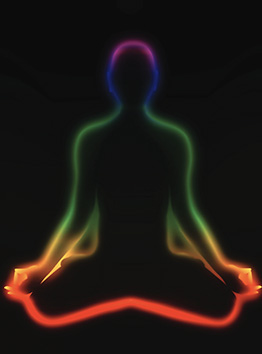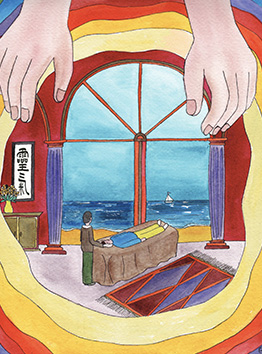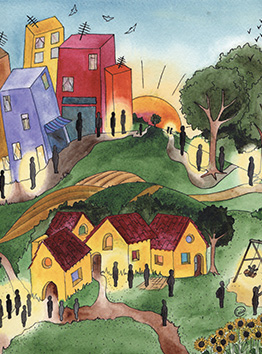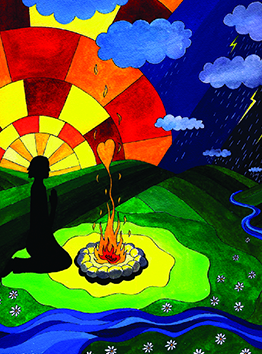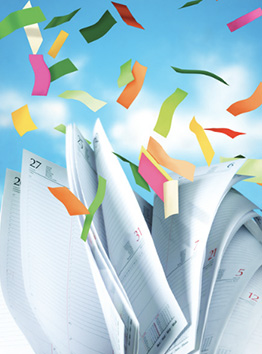
Reiki Heals “The Shoulds”
by Colleen Benelli
First Published – Reiki News Magazine, Fall 2019
Recently I noticed that I felt stuck in a cycle of what I call “the shoulds.” No matter what I was doing, I felt like I should be doing something different. No matter how much I accomplished, I had so much more I should get done. I couldn’t relax while I was relaxing, thinking of all the other things I should be doing, and when I was doing things, I thought I should be relaxing. I’m dealing with the shoulds right now while writing, thinking I should go for a walk, I should go to the barn and clean stalls, I should get the dishes done, and so on. Some days the shoulds make me feel like I am walking in circles, undecided about what to do next.
People nod their heads in agreement when I say, “I am stuck in the shoulds.” They know what I mean. I had no idea that so many people experience the shoulds at various levels of difficulty. It is a much bigger issue than I was aware. Now I know why Reiki guided me to write about the shoulds—because Reiki can help to heal them.
In the uses described below, you will see that not all need healing as there are positive and helpful ways should can be used in a sentence. However, the focus of this article is on the unhealthy ways should is sometime used and how Reiki can be used to stop using it in this way. To this end, I will present a Reiki technique you can use to help you identify and heal your unhealthy shoulds. It includes whole body listening and automatic writing. It is an awake meditation.
Definition of Should
The Oxford Dictionaries defines various uses of the word should. (1) The first definition is: “Used to indicate obligation, duty, or correctness, typically when criticizing someone’s actions.” It includes examples of usage—He should have been careful; I think we should trust our people more. Other definitions of the word should have a neutral or positive meaning, such as “Indicating a desirable or expected state.” An example of this usage would be—The relationship between a Reiki practitioner and client should lead to trust and honesty. Another neutral definition is “Used to indicate what is probable.” I should meet a lot of great people at the Reiki Retreat. In other uses, should is used to indicate how to achieve a desirable outcome. An example of this usage is—If you want to have a thriving Reiki practice, you should focus more on marketing.
I thought the expression “the shoulds” was a term I used to indicate when I felt stuck in a kind of mind loop. I was unaware that the shoulds are a common term in counseling until I researched the concept of should online and discovered that the prominent German psychoanalyst Karen Horney (1885-1952) had a phrase for this phenomenon. She called it “the tyranny of the should.” (2) She viewed shoulds as dividing our personalities into two selves—an ideal self and a real self. When we don’t live up to the ideal self, we become split, and the inner critic comes out.
I also found that “shoulding yourself,” is a term used in psychology, coined by psychologist Clayton Barbeau, to describe this as a “cognitive distortion.” (3) It refers to humans’ tendency to tell ourselves that we “have to” do something, no matter if it fits with our goals or values or not.
Whether the shoulds are a simple distraction and annoyance, a procrastination technique, a cognitive distortion, or a daily life circumstance requiring tough decisions, changes or actions, Reiki can guide you through them by connecting you to your inner guidance. Sometimes the shoulds are inner guidance. Sometimes they are bringing to your attention something that you want to do that you aren’t doing. Something as simple as, I should eat healthier, might be a real statement of fact. Similarly, when you know you need to make a dramatic life decision or change, the should may tell you what actions you need to take. When many shoulds become such a huge distraction and a mind management challenge, I use Reiki.
Understanding and Identifying the Shoulds
Shoulds can develop because of cultural expectations from your family, peers, generation, gender, and the country and culture where you are born and live. Many cultural shoulds are beneficial and meant to guide the habits of growing children, and assist adults. I have clients who have immigrated from a country with strict cultural expectations and shoulds, and it is quite a change for them to live in a place where so many choices are acceptable. The shoulds in each culture are different.
Sometimes the word should shows a goal worth attaining, and it helps you identify your intentions. However, shoulding is different because it suggests a criticism or unmet expectation.
Shoulding is something we do to ourselves, to others, and others do to us. Sometimes a should is self-directed—I should lose weight; I should have a better job; I can’t believe I said that; I should have just smiled and nodded, and so on.
Shoulding is also something we do to others—stating how they should act, what choices they should make, how they should be in a relationship with you or others, how they should live their lives. When we should against someone else, what we are often saying is that they do not measure up to our expectations. Others should us in the same ways saying how we should act, what our choices should be, and the list goes on.
Reiki people can have spiritual shoulds—I should use my Reiki more and heal more people. I should want to have a Reiki business. I should work harder at my spiritual practices. I should feel more tolerant, and so forth. Again, sometimes, the word should is a gentle reminder of our intentions and nudges us to accomplish them. Reiki can help you discern what the helpful shoulds versus the ones you “should” let go of are.
In a WebMD blog, Seth J. Gillihan, Ph.D., provides his perspective on shoulds:
All this shoulding becomes a heavy weight as we continually judge reality against an imagined standard. When we “should” against ourselves, we imply that we’re doing something wrong and end up feeling disappointed with ourselves for not measuring up in some way. Doing this habitually contributes to depression. When we use “should” against others, we tell ourselves they’re failing to live up to a reasonable expectation. As a result, we feel angry or resentful. When we “should” against our circumstances, we feel frustrated and might think we’re getting a raw deal. (4)
Clarify and Heal the Shoulds
If we recognize that the shoulds can influence our thoughts, possibly making us feel insecure about our choices, even disempowering us by making us think that we have to , must , need or ought to do certain things out of duty, obligation or compulsion, we can begin to question and clarify our actions.
In an article in Psychology Today, author Rick Hanson, Ph.D. advises you to look at the should and ask yourself, “Is it really true?” and let the answer reverberate inside you. (5) Reiki gives you access to your inner and spiritual guidance to answer that question. First, notice that you are dealing with the shoulds. Then let Reiki help you discern the answer to the question, “What is true about this should?” Reiki can heal you so you can either release the should or act on something you prefer to do and haven’t done yet.
Reiki can help you recognize possible self-sabotage. Shoulds can be a pathway to self-criticism, disparagement of others, and a path for others to criticize you. They can cause annoyance, procrastination and overwhelm, guilt, low self-esteem. Reiki energy can help you determine your choices and actions and return you to a healed and balanced perspective of the meaning of should.
When you receive Reiki, you are inviting in higher energy that elevates your consciousness so you can think more clearly. Reiki energy works for the shoulds. I love the SHK symbol and the Karuna Reiki® symbols Kriya and Iava, however, all the Reiki symbols effect change with the shoulds, so call in all the ones with which you like to work.
If you need to release a should, invite Reiki to help you let it go and heal it to its original cause. If you realize a should is inner guidance encouraging you to do something you want to do and haven’t done yet, let Reiki heal the obstacles and resistances, and empower your gifts and capabilities so you can accomplish your goal. The Holy Fire® Healing Experience and the Usui/Tibetan Reiki Healing Attunement are Reiki techniques for the shoulds and here is another Reiki technique you can use to help you identify and heal your shoulds. It includes whole body listening and automatic writing. It is an awake meditation.
Whole Body Listening
There is a common saying in spiritual work, “Get out of your head and into your heart.” Reiki takes this one step further. Reiki aligns your head and your heart, so they have an equal voice. Reiki heightens your perspective, so all parts of you have a voice. Your head contains much valid information important to consider along with your heart. With whole body listening, you can hear your inner guidance and spiritual guidance from all different perspectives.
A Shoulds Reiki Healing Technique
I encourage you to use automatic writing for this technique. Automatic writing is putting your pen to paper and writing without evaluating what you write. So have a pen and paper or your journal so you can write your answers with automatic writing.
In this technique, you will go into a self-Reiki session, but you can remain with your eyes open if you need to read the script. The session asks you to listen for a should with which you need help. It heals the unhealthy influences surrounding that should, then fills your chakras with the colors of the earth and creation to balance them. You are asked to let each chakra speak. There are additional questions. These are an excellent place to use your automatic writing.
Activate Reiki your way—go into self-Reiki or meditation.
- Think about a should you would like to have clarity and healing around.
- Imagine your chakras, both the front and back aspects of you.
- Your chakras are all sitting around an oval table.
- Each has its color, red, orange, yellow, green, blue, indigo, and violet.
- Some colors are bright and energetic; some are weak. Notice them.
- Ask Reiki to lift from you the unhealthy outside influences around this should. Invite Reiki and the light of the earth, to fill your body and each of your chakras with the full vitality of the earth’s colors.
- Your body is made of the earth and spirit and receives the earth energy and strengthens the colors of your chakras.
- Now invite the full vitality of the colors of creation to fill your chakras.
- Your chakras are now bright and present.
Begin your automatic writing.
- Think about your specific should.
- Ask, “What is the truth about this should?”
- Imagine that each chakra has a perspective about this should.
- Each chakra now takes a turn to speak its voice, going around the table. One chakra speaks at a time, and all others listen until it is their turn.
Your root chakra tells you your practical, material, logical perspective.
Your sacral chakra, your creative perspective.
Your solar plexus, your perspective.
Your heart, your heart’s perspective.
Your throat, your truth’s perspective.
Your third eye, your inner guidance, intuitive perspective.
Your crown, your spiritual perspective.
- Allow each part of you to speak. Listen to all.
- Now invite Reiki to organize your thoughts around your whole-body perspectives.
- Ask these questions:
What does your heart say about what your head says;
What does your head say about what your heart says?
What is the spiritual perspective; what is the logical perspective? How do they align?
- Now go directly to your choices:
What are my options?
Do I want to make decisions and act?
What decisions do I want to make?
What actions do I want to take?
- Bring your awareness back.
Read what you wrote.
Ask Reiki to help you organize your thoughts.
Ask Reiki to keep guiding you.
Conclusion
Use Reiki to identify your shoulds, determine what is right about them, then heal and empower you to follow your truth. I believe that the shoulds I have been managing will release and lighten up! Luckily, when I honestly look at them, I can see that they are a distraction more than anything else. So, I will continue to use Reiki to help me focus on my priorities instead.
Holy Fire® and Karuna Reiki® are registered service marks of William Lee Rand.
Endnote
- “Should | Definition of Should in English by Oxford Dictionaries.” Oxford Dictionaries | English. https://en.oxforddictionaries.com/definition/should.
- Boeree, C. George, Karen Horney, http://webspace.ship.edu/cgboer/horney.html.
- https://www2.palomar.edu/users/jtagg/should.htm.
- “How to Get Rid of the ‘Shoulds’.” WebMD, https://blogs.webmd.com/mental-health/20180731/how-to-get-rid-of-the-shoulds.
- “Drop the “Shoulds.” Psychology Today, https://www.psychologytoday.com/us/blog/your-wise-brain/201712/drop-the-shoulds.
Colleen Benelli is a Licensed Senior Reiki Master Teacher, Holy Fire® III; Co-Director of Licensed Reiki Master Teachers; ICRT Mentor Teacher; the founder of Reiki Lifestyle and the Reiki Lifestyle Podcast and an Associate Teacher for the Light-Song School of Shamanic Studies. Colleen lives and teaches in Portland, Oregon. Contact Colleen by email at colleen@reikilifestyle.com, on her website at www.reikilifestyle.com or by phone at (503) 912-0664.


